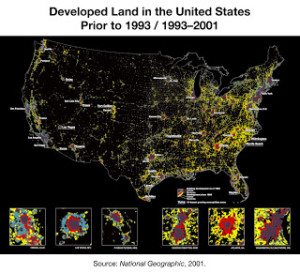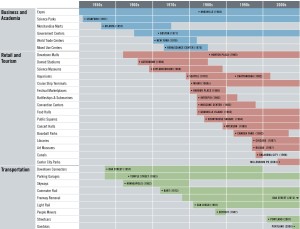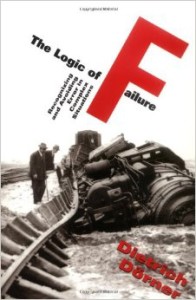Portland is one of the most-praised cities in contemporary America. But is the hype real? To some extent, it actually understates the case. Portland didn't invent bicycles, density or light rail -- but it understood the future implications of them for America's smaller cities first, and put that knowledge to use before anyone else. The longest journey begins with a step, but you have to take it. Nobody else did. In an era where most American cities went one direction, Portland went another, either capturing or even creating the zeitgeist of … [Read more...]
Employment Challenges Facing Smaller City Downtowns
I recently wrote about the return of jobs to downtown in large tier one cities like Chicago. There are a number of factors driving this: the rise of the "global city", the locational advantage of downtown for commuters, the significant rise in central city residency for professionals, etc. This has enabled the central cores of cities like New York to remain extremely strong even if in some sense they are losing job share to the suburbs or even outright losing jobs (as in Chicago). Smaller cities, which I define as anyone below those tier one … [Read more...]
Resolving the Paradox of Success
In a previous posting on innovation, I talked about how coming up with innovative new ideas is surprisingly easy. It is actually trying to do them that is hard. I pointed out many of the structural barriers to this, most of which lie in the realm of organizational dynamics. One of the problems is what I call the “paradox of success”. That is, it is harder for someone, be it an individual or company, to do something new and different to the extent that what they are currently doing is already successful. This actually seems, like the … [Read more...]
Learning to Love “Naptown”
Indianapolis has long chafed under the memory of being mocked by out of towners and bigger markets as “India-no-place” or “Naptown”. As with many nicknames, the actual origin of the term “Naptown” is in dispute. It has variously been attributed as an insult implying a sleepy, boring town; coming from call letters of WNAP radio; or originating in 1920's jazz from the so-called “Naptown sound”. Given that the “nap” syllable occurs in the long Indianapolis, a short form or diminutive is implied. Whatever the case, the word Naptown has long … [Read more...]
The Power of Greenfield Economics
I've touched on this before in other posts, but it is worth highlighting again. The great move from the city to the suburbs has been attributed to various factors: changing lifestyle preferences, the automobile, subsidies to sprawl, urban industrial pollution, etc. While there is probably truth in all of these, possibly the most powerful of them all is greenfield economics. What is greenfield economics? This is simply the set of conditions that flow from building on new territory or exploiting new markets vs. redevelopment of old places, … [Read more...]
The Sprawl Bubble
[ Buffalo's Chuck Banas is a great thinker, doer, and writer on urban matters. He graciously allowed me to repost some of his articles, and this is sadly the last one I have on file. It was written in 2009 and so some of it addresses what was going on at that time, but the perspective remains relevant, even if sprawl is not your issue. - Aaron. ] I’m certainly not the first pundit to comment on the recent economic meltdown, and I sure won’t be the last. But there is a side to this crisis that almost no one is talking about, perhaps because … [Read more...]
The 31-Flavors of Urban Redevelopment
Aaron Renn’s March 24 posting on “The Logic of Failure” and his reference to “silver bullet” solutions for redevelopment and revitalization reminded me of my visit to the “Creative Cities Summit”, about revitalizing cities, three years ago this fall. The setting, timing and venue could not have been better, at least in terms of provoking thought about how to do things better. The setting was Detroit, the time was October, 2008, when the financial markets were crumbling, and the venue was Renaissance Center (“RenCen”), the Robocop-like mixed … [Read more...]
The Logic of Failure
"It is far from clear whether 'good intentions plus stupidity' or 'evil intentions plus intelligence' have wrought more harm in the world. People with good intentions usually have few qualms about pursuing their goals. As a result, incompetence that would otherwise have remained harmless often becomes dangerous...Failure does not strike like a bolt from the blue; it develops gradually according to its own logic. As we watch individuals attempt to solve problems, we will see that complicated situations seem to elicit habits of thought that set … [Read more...]
Beyond Brain Drain
[ I wrote this for a newspaper in Indianapolis, but it's applicable everywhere. - Aaron] Much of the anxiety around human capital in places like Indiana revolves around the so-called “brain drain,” or loss of educated young people after they leave school. But while many would-be brain drain plugs are without question valuable, especially those focused on boosting education, the problem is actually much more complex than that simple idea suggests. Firstly, a lot of the regions and states that have bled population don't have especially high … [Read more...]
The City as a Platform
I've seen and heard a lot about the notion of a "city as a platform". I haven't seen a lot of great definitions of exactly what is meant by it though, so I thought I would explore various dimensions of the concept a bit. Let's take a look at the actual definition of the word platform, of which there are several: a raised horizontal surface or stage a document stating the aims and principles of a political party the combination of a particular computer and a particular operating system a military structure or vehicle bearing … [Read more...]
- « Previous Page
- 1
- …
- 26
- 27
- 28
- 29
- 30
- …
- 36
- Next Page »


